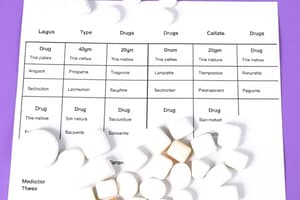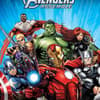Podcast
Questions and Answers
Analgesics are drugs that relieve ______.
Analgesics are drugs that relieve ______.
pain
Antacids are used to relieve indigestion and ______.
Antacids are used to relieve indigestion and ______.
heartburn
Antihistamines counteract the effects of ______.
Antihistamines counteract the effects of ______.
histamine
Antidepressants can be categorized into tricyclics, MAO inhibitors, and ______.
Antidepressants can be categorized into tricyclics, MAO inhibitors, and ______.
Anticoagulants prevent blood from ______.
Anticoagulants prevent blood from ______.
Antibiotics combat ______ infections.
Antibiotics combat ______ infections.
Antineoplastics are drugs used to treat ______.
Antineoplastics are drugs used to treat ______.
Antipyretics are used to reduce ______.
Antipyretics are used to reduce ______.
Antivirals are drugs used to treat ______ infections.
Antivirals are drugs used to treat ______ infections.
Beta-blockers reduce the oxygen needs of the heart by reducing ______ rate.
Beta-blockers reduce the oxygen needs of the heart by reducing ______ rate.
Bronchodilators help ease breathing in diseases such as ______.
Bronchodilators help ease breathing in diseases such as ______.
Corticosteroids are primarily used as ______ in conditions like arthritis.
Corticosteroids are primarily used as ______ in conditions like arthritis.
Cough suppressants can soothe throat irritation but do not actually suppress ______.
Cough suppressants can soothe throat irritation but do not actually suppress ______.
Diuretics are useful in treating mild cases of high blood ______.
Diuretics are useful in treating mild cases of high blood ______.
Decongestants help relieve nasal stuffiness by reducing swelling of the mucous ______.
Decongestants help relieve nasal stuffiness by reducing swelling of the mucous ______.
Expectorants stimulate the flow of saliva and promote ______ to eliminate phlegm.
Expectorants stimulate the flow of saliva and promote ______ to eliminate phlegm.
Flashcards are hidden until you start studying
Study Notes
Analgesics
- Drugs classified as non-narcotic for mild pain relief and narcotic for severe pain relief.
Antacids
- Neutralize stomach acid to alleviate indigestion and heartburn.
Antianxiety Drugs
- Often referred to as anxiolytics, sedatives, or minor tranquilizers; they suppress anxiety and relax muscles.
Antiarrhythmics
- Medications used to manage irregular heartbeats.
Antibacterials & Antibiotics
- Antibacterials treat infections; antibiotics combat bacterial infections, with some being narrow-spectrum (targeting specific bacteria) and others broad-spectrum (effective against a wide range).
Anticoagulants and Thrombolytics
- Anticoagulants prevent blood clotting while thrombolytics dissolve existing blood clots, useful in cases of arterial or venous thrombosis.
Anticonvulsants
- Medications designed to prevent epileptic seizures.
Antidepressants
- Classified mainly into three groups: tricyclics, monoamine oxidase inhibitors, and selective serotonin reuptake inhibitors (SSRIs).
Antidiarrheals
- Relieve diarrhea, with two main types: adsorbent substances and drugs that slow bowel contractions.
Antiemetics
- Used to treat nausea and vomiting.
Antifungals
- Target fungal infections, commonly affecting hair, skin, nails, and mucous membranes.
Antihistamines
- Primarily counteract the effects of histamine involved in allergic reactions.
Antihypertensives
- Lower blood pressure; include diuretics, beta-blockers, calcium channel blockers, ACE inhibitors, centrally acting antihypertensives, and sympatholytics.
Anti-Inflammatories
- Reduce inflammation characterized by redness, heat, swelling; used in conditions like rheumatoid arthritis and gout.
Antineoplastics
- Medications utilized in cancer treatment.
Antipsychotics
- Used for severe psychiatric disorders; also known as major tranquilizers.
Antipyretics
- Drugs that help reduce fever.
Antivirals
- Treat viral infections or provide temporary protection against viruses, such as influenza.
Barbiturates
- Known as sleeping drugs, used for inducing sleep.
Beta-Blockers
- Reduce heart oxygen demand by decreasing heart rate.
Bronchodilators
- Expand bronchial tubes; beneficial for easing breathing in asthma patients.
Cold Cures
- No cure for colds exists; alleviation can be achieved with aspirin or acetaminophen combined with decongestants, antihistamines, and caffeine.
Corticosteroids
- Serve primarily as anti-inflammatories in conditions like arthritis or asthma, also used to treat some cancers and adrenal insufficiencies.
Cough Suppressants
- Soothe throat irritation; actual cough suppressants include codeine and dextromethorphan alongside mucolytics and expectorants which help manage phlegm.
Cytotoxics
- Kill or damage cells; used as antineoplastics and immunosuppressives.
Decongestants
- Reduce nasal mucous membrane swelling by constricting blood vessels, alleviating stuffiness.
Diuretics
- Increase urine production to eliminate excess bodily fluid, beneficial for treating fluid retention and mild hypertension.
Expectorants
- Stimulate saliva flow and promote coughing to clear phlegm from the respiratory tract.
Studying That Suits You
Use AI to generate personalized quizzes and flashcards to suit your learning preferences.





